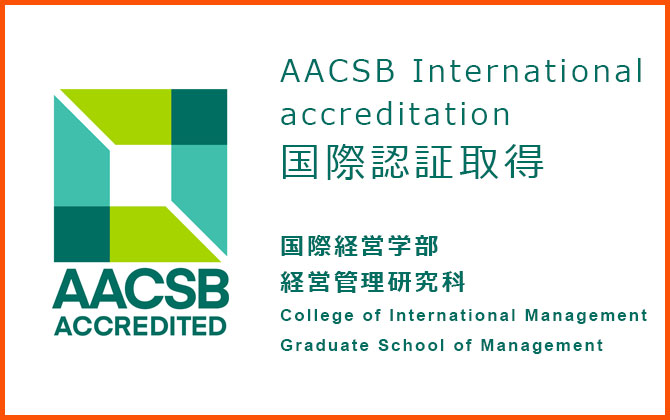On August 10, 2016, AACSB International announced that Ritsumeikan Asia Pacific University has been awarded AACSB International accreditation for the College of International Management (APM) and Graduate School of Management (GSM).
What is AACSB?
Established in 1916, the Association to Advance Collegiate Schools of Business (AACSB) is a global membership organization of educational institutions, businesses, and other entities committed to the advancement of management education.
AACSB accreditation is widely regarded as the highest level of accreditation for business schools. Being an AACSB-accredited business school means being part of a network of 775 institutions spanning 52 countries and territories* across the globe who have successfully met the standards set forth by the association, and who have committed to maintaining these standards. Less than 5% of the 16,000 business school programs worldwide have earned this accreditation.
*As of August 2016.
Accreditation and APU
Ritsumeikan Asia Pacific University is one of only three institutions in Japan to achieve this accreditation to date. Out of these institutions, we are the only one offering an undergraduate business curriculum in both English and Japanese as well as an AACSB-accredited MBA program conducted entirely in the English language.
Our College of International Management and Graduate School of Management began the AACSB accreditation process because we recognized that international accreditation is an important part of meeting the expectations of our stakeholders. We also realized that this accreditation would be valuable in attracting top talent to our faculty as well as our student body.
As part of the accreditation process, the College of International Management is making changes to our undergraduate business school curriculum, introducing additional core courses and adding a comprehensive capstone course that will challenge our students to utilize the skills they have learned. These changes will further bring our undergraduate business programs in line with international standards, providing our graduates with the skills and knowledge they need to enter the fast-changing world of international business.
Both the College of International Management and the Graduate School of Management will undergo a continuous review process to ensure that they maintain a high level of quality and a focus on continuous improvement in areas including learning and evaluation, academic and professional engagement, and strategic management and innovation.
The benefits of accreditation
Studying at an AACSB-accredited institution carries a number of benefits for students.
Connections and partnerships
Being AACSB-accredited provides assurance to other schools that our faculty and programs meet established international standards. This means that our current existing network of 454 partner institutions will continue to expand into the future.
Quality of instruction
As an AACSB-accredited institution, our faculty must meet and uphold standards in research and qualifications, providing a higher level of experience and expertise.
Assurance of learning
Faculty and administrators engage in a process of continuous review and improvement, ensuring that all students in the College of International Management and the Graduate School of Management learn and grow according to the mission and learning goals of their programs, maintaining a high quality educational experience for all business students.
Continuous improvement
The process of achieving accreditation helps us refine our strategic direction, improve overall program and faculty quality, and provides us with an organized framework for tracking and supporting our day-to-day operations. As an accredited institution, we are dedicated to sustaining a commitment to high quality and alignment with the spirit and intent of the accreditation standards.
Value for graduates
AACSB-accredited schools are recognized worldwide by top employers and other institutions. They also have more access to recruiters, and have graduates that tend to receive higher, more competitive salaries.
President Korenaga's comments on accreditation can be found here.










